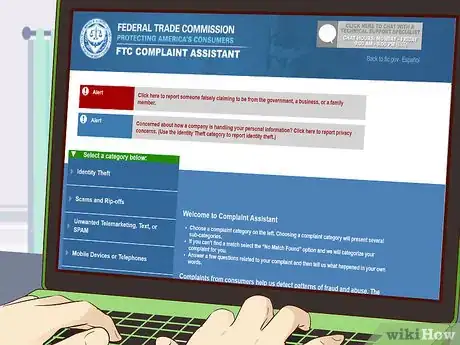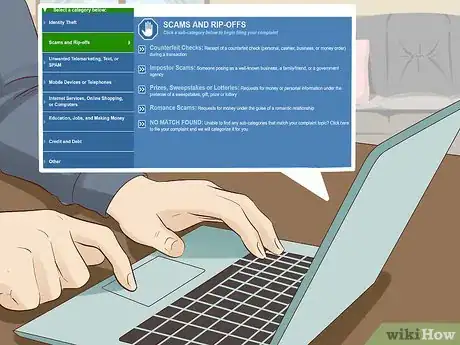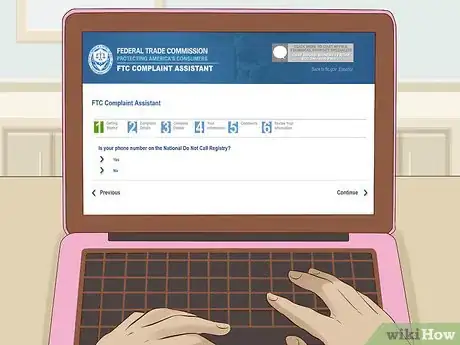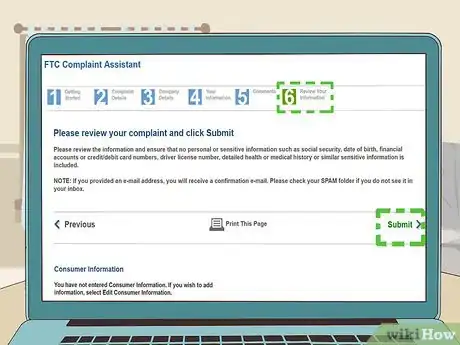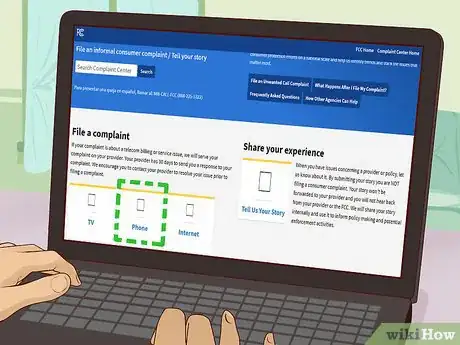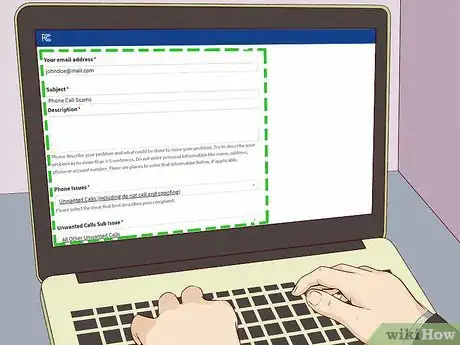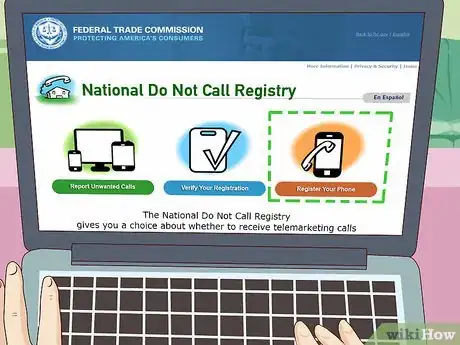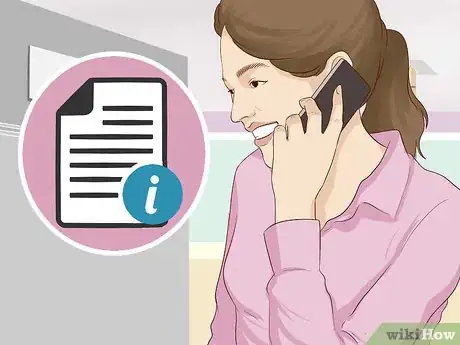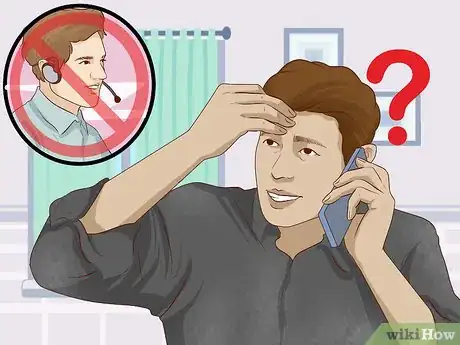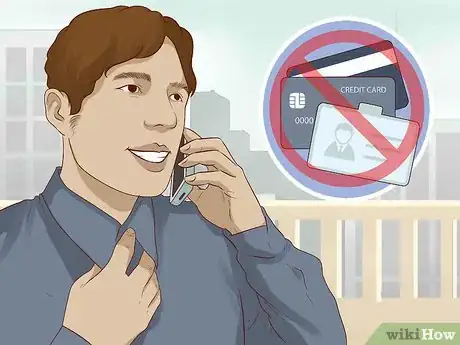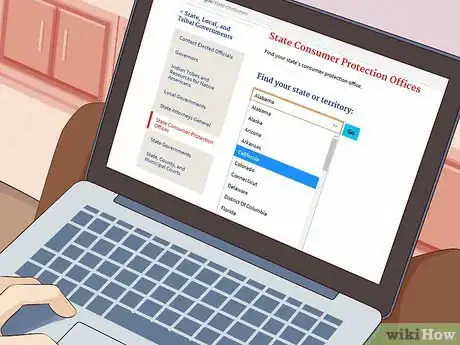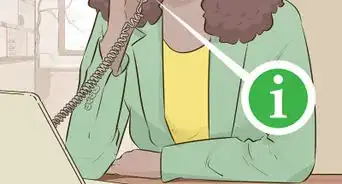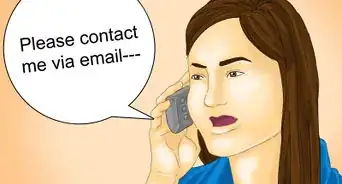This article was co-authored by Scott Nelson, JD and by wikiHow staff writer, Jennifer Mueller, JD. Scott Nelson is a Police Sergeant with the Mountain View Police Department in California. He is also a practicing attorney for Goyette & Associates, Inc. where he represents public employees with a myriad of labor issues throughout the state. He has over 15 years of experience in law enforcement and specializes in digital forensics. Scott has received extensive training through the National Computer Forensics Institute and holds forensic certifications from Cellbrite, Blackbag, Axiom Forensics, and others. He earned a Master of Business Administration from the California State University Stanislaus and a Juris Doctorate from the Laurence Drivon School of Law.
There are 8 references cited in this article, which can be found at the bottom of the page.
This article has been viewed 37,596 times.
If you fall victim to a phone scam, take a deep breath and collect yourself. Call local law enforcement using the non-emergency number and tell the officer that you are the victim of a scam and want to file a police report. Even if you didn't fall for the scam, however, you can still report it. In the US, the Federal Trade Commission (FTC) and the Federal Communications Commission (FCC) handle phone call scam complaints.[1]
Steps
Filing a Complaint with the FTC
-
1Visit the FTC's Complaint Assistant online. Report a phone call scam to the FTC at https://www.ftccomplaintassistant.gov/. The FTC evaluates your complaint and shares it with appropriate state, local, federal, and international law enforcement agencies.[2]
- While the FTC does not resolve individual cases, they do establish patterns of fraudulent behavior and send alerts to law enforcement and the public about active trends in scams.
-
2Choose the correct category and sub-category. For most phone call scams, choose "Scams and Rip-Offs" from the category list. From this category, choose "Imposter Scams" if the caller was posing as a well-known business or government agency. If the scammer was trying to convince you that you won money in a sweepstakes or lottery, click on "Prizes, Sweepstakes or Lotteries."[3]
- If there isn't an appropriate sub-category for the scam phone call you received, choose "NO MATCH FOUND." The FTC will categorize your complaint appropriately after you file it.
- For scam text messages rather than calls, click on "Mobile Devices or Telephones," then choose "Unwanted Text Messages."
Advertisement -
3Use the Complaint Assistant to enter information about the scam. Provide as many specific details as you can about the scam. Include the phone number that called you (if it wasn't blocked) and what the caller said. If the caller identified themselves by name, include their name in your complaint.[4]
- You might also include a description of the caller or their voice. For example, you could include whether the person sounded male or female, or if they had a particular regional or international accent.
- You can't attach files to your complaint. However, if you have a voicemail or other recording of the scam phone call, make a statement to that effect in your complaint.
Tip: You aren't required to provide your name or contact information. However, if you do, the FTC or law enforcement agencies can contact you if your complaint is used in an investigation or legal proceedings and they need more information.
-
4Review and submit your complaint. Once you've finished entering information, click through to the review page. Read over everything carefully, proofreading for errors and double-checking that you've included all relevant information. When you're satisfied with the information you've provided, click "Submit."[5]
- You also have the option of printing the page for your records. It's a good idea to print your complaint if you plan on submitting reports or complaints to other agencies. Then you can just copy the same information for additional complaints.
- If you included an email address, the FTC will send you a confirmation email that your complaint has been received.
Reporting the Scam to the FCC
-
1Visit the FCC's Consumer Complaint Center online. The FCC takes complaints online at https://consumercomplaints.fcc.gov/hc/en-us. On the home page, under "File a complaint," select the icon labeled "Phone" to proceed.[6]
- The "Phone Form" page provides a description of various issues included under this category. Read through them, then scroll down to the bottom of the page for a link to the complaint form.
-
2Fill out the complaint form. The fields marked with a red asterisk must be completed before you can submit your complaint. Although you don't have to provide any additional identifying information, an email address is required to submit a complaint to the FCC.[7]
- Provide a short, 3-5 sentence description of the scam call you received. If you have a voicemail or audio recording of the scam call, you can attach it at the bottom of the form.
- For the "Phone Issues" line under the description, select "unwanted calls," then select "all other unwanted calls" as the sub-issue.
Tip: If you racked up phone charges as a result of the scam, select "billing." Your complaint will also be forwarded to your provider, who will have 30 days to respond.
-
3Share your story if you don't want to file a complaint. FCC complaints normally are served on your service provider. If you don't see any reason for that to happen, you can choose to share your story instead. Your story will be used within the agency to identify trends and issues related to phone call scams and other fraudulent activity.[8]
- To "share your story" with the FCC, you are required to provide your first and last name, state, and zip code, as well as a valid email address. Optionally, you can also provide a phone number where you can be reached.
- Typically, the FCC will not contact you or respond to your story after you submit it.
Recognizing and Preventing Phone Scams
-
1Learn how to spot red flags of phone scams. Scammers typically use exaggerated prizes as bait to hook you into giving them your personal or financial information.[9] If you receive a call saying that you've won a sweepstakes or contest that you don't remember entering, it's likely a scam.[10]
- Also be wary if the person insists that you can trust them, that there's no need to check into their business, or that you have to act immediately to take advantage of their offer.
- If the caller claims that you've won a prize or free gift, but have to pay for shipping and handling, it's likely a scam. Once you give them your credit card number, they can charge as much as they like.
-
2Register for the National Do Not Call Registry. Go to https://www.donotcall.gov/ and click the "Register Your Phone" icon to get started. You can register both landlines and mobile phones on the registry.[11]
- The registry removes your number from telemarketing lists. Telemarketers are legally barred from calling any registered number.
- Once you register your number, there's a 31-day waiting period. After that time, you can report any unwanted calls or potential scams directly on the website for the National Do Not Call Registry.
-
3Request written information about any offers. If the caller claims they have a great offer or investment opportunity for you, ask them to send you written information so you can evaluate the terms in your own time and make an informed decision.[12]
- Anyone with a legitimate offer would be happy to do this for you. If they refuse to send written information or insist that you have to make a decision immediately, the offer is most likely a scam.
- Even if the offer is legitimate, it's a good habit to get the details of the offer in writing before you make a decision – especially if an unsolicited phone call is the first time you've heard of the offer.
Be careful! Charity scams are prevalent, especially around the holidays. The scammer will likely try to guilt trip you into making a donation. Ask for written information and time to think it over. Any legitimate charity would have no problem doing this.
-
4Resist high-pressure tactics from telemarketers. Telemarketers trying to scam you typically talk fast and try to overwhelm you with information. They want to disorient you so that you'll just agree to whatever they say. If a caller is speaking too quickly or using vague language, ask them to speak more slowly or clarify.[13]
- Ask the caller why they're in such a hurry, or why it's so important for you to make a decision right away. If you feel comfortable being more confrontational, you can point out that if their offer was legitimate and really as good as they claim, they would be more than happy to give you time to research the details.
- Don't forget that you can always just hang up. A telemarketer or scammer will often try to make you feel rude or guilty for hanging up, but there's nothing rude about hanging up on an unsolicited phone call from a person you don't know.
-
5Refuse to share or "confirm" personal information. Many scammers will claim they already have your information, and ask you to confirm it. Sometimes they'll have at least some of your information, such as a partial (or even complete) address. They're looking for confirmation so they know that the information they've acquired is legitimate.[14]
- Never give out a credit or debit card number, bank account number, or Social Security number over the phone to an unsolicited caller.[15] If they are calling from a legitimate business or agency, they typically won't call or ask for this information. Hang up and call the business or agency they claim to be from. A customer service representative can tell you whether it was a legitimate call or a scam.
-
6Research offers with your local consumer protection agency before accepting. If there's a scam making the rounds in your area, your local consumer protection agency likely has information about it. They can also provide you with information on how to respond to the scam.[16]
- You can find contact information for state and local consumer protection agencies at https://www.usa.gov/state-consumer. Simply select your state from the drop-down menu.
Expert Q&A
Did you know you can get expert answers for this article?
Unlock expert answers by supporting wikiHow
-
QuestionHow do I report spam phone calls?
 Scott Nelson, JDScott Nelson is a Police Sergeant with the Mountain View Police Department in California. He is also a practicing attorney for Goyette & Associates, Inc. where he represents public employees with a myriad of labor issues throughout the state. He has over 15 years of experience in law enforcement and specializes in digital forensics. Scott has received extensive training through the National Computer Forensics Institute and holds forensic certifications from Cellbrite, Blackbag, Axiom Forensics, and others. He earned a Master of Business Administration from the California State University Stanislaus and a Juris Doctorate from the Laurence Drivon School of Law.
Scott Nelson, JDScott Nelson is a Police Sergeant with the Mountain View Police Department in California. He is also a practicing attorney for Goyette & Associates, Inc. where he represents public employees with a myriad of labor issues throughout the state. He has over 15 years of experience in law enforcement and specializes in digital forensics. Scott has received extensive training through the National Computer Forensics Institute and holds forensic certifications from Cellbrite, Blackbag, Axiom Forensics, and others. He earned a Master of Business Administration from the California State University Stanislaus and a Juris Doctorate from the Laurence Drivon School of Law.
Police Sergeant, Mountain View Police Department It really depends on where you live and the severity of the scam calls. The laws surrounding scam call reporting are evolving all the time, so it can be kind of confusing to figure out who you need to talk to. I'd suggest calling your local police department and just asking them who you should call. They'll have the information you need.
It really depends on where you live and the severity of the scam calls. The laws surrounding scam call reporting are evolving all the time, so it can be kind of confusing to figure out who you need to talk to. I'd suggest calling your local police department and just asking them who you should call. They'll have the information you need.
Warnings
- This article primarily covers how to report phone call scams in the US. If you live in another country, contact local law enforcement or your nearest consumer protection agency.⧼thumbs_response⧽
References
- ↑ https://www.usa.gov/stop-scams-frauds#item-35157
- ↑ https://www.ftccomplaintassistant.gov/#crnt&panel1-1
- ↑ https://www.ftccomplaintassistant.gov/#crnt&panel1-1
- ↑ https://www.ftccomplaintassistant.gov/#crnt&panel1-1
- ↑ https://www.ftccomplaintassistant.gov/#crnt&panel1-1
- ↑ https://consumercomplaints.fcc.gov/hc/en-us
- ↑ https://consumercomplaints.fcc.gov/hc/en-us/requests/new?ticket_form_id=39744
- ↑ https://consumercomplaints.fcc.gov/hc/en-us/articles/115000430423-Tell-Us-Your-Story
- ↑ Scott Nelson, JD. Police Sergeant, Mountain View Police Department. Expert Interview. 2 April 2020.
- ↑ https://www.consumer.ftc.gov/articles/0076-phone-scams
- ↑ https://www.consumer.ftc.gov/articles/0076-phone-scams
- ↑ https://www.consumer.ftc.gov/articles/0076-phone-scams
- ↑ https://www.consumer.ftc.gov/articles/0076-phone-scams
- ↑ Scott Nelson, JD. Police Sergeant, Mountain View Police Department. Expert Interview. 2 April 2020.
- ↑ Scott Nelson, JD. Police Sergeant, Mountain View Police Department. Expert Interview. 2 April 2020.
- ↑ https://www.consumer.ftc.gov/articles/0076-phone-scams
- ↑ https://www.consumer.ftc.gov/articles/0076-phone-scams
- ↑ https://www.econsumer.gov/#crnt
